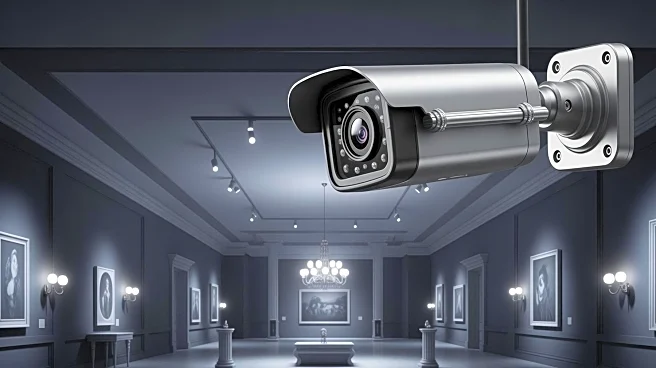What's Happening?
Kelly Reichardt's latest film, 'The Mastermind,' delves into the story of James Blaine 'JB' Mooney, portrayed by Josh O'Connor, who plans a heist of four Arthur Dove paintings. Set in the 1970s, the film examines JB's life post-heist, highlighting themes
of boredom and ambition. Reichardt's ninth feature blends comedy and tension, focusing on the aftermath of the heist and JB's struggle with mediocrity. The film features a strong supporting cast, including John Magaro, Bill Camp, Gaby Hoffmann, and Alana Haim. Reichardt's work challenges audience expectations, offering a unique perspective on genre filmmaking.
Why It's Important?
Reichardt's exploration of surveillance and security in 'The Mastermind' raises questions about privacy and the value of art in contemporary society. The film's setting in the 1970s contrasts with today's pervasive surveillance, prompting viewers to consider the implications of constant monitoring. Reichardt's approach to storytelling, which defies conventional genre norms, encourages audiences to reflect on their expectations and the narratives they consume. This film contributes to ongoing discussions about the role of art and cinema in challenging societal norms and perceptions.
What's Next?
As 'The Mastermind' continues to screen, it may spark conversations about the balance between security and privacy in public spaces. Reichardt's film could influence other filmmakers to explore similar themes, potentially leading to a broader examination of surveillance culture in cinema. Audience reactions, particularly from younger viewers, may provide insights into generational perspectives on privacy and art. The film's reception could also impact Reichardt's future projects, encouraging her to further explore unconventional narratives and themes.
Beyond the Headlines
Reichardt's film highlights the ethical considerations of surveillance and the commodification of art. By depicting a world with less security, 'The Mastermind' invites viewers to question the societal shift towards constant monitoring. The film's focus on character-driven storytelling challenges the traditional heist genre, offering a nuanced view of ambition and isolation. Reichardt's work underscores the importance of artistic expression in addressing complex cultural issues, encouraging audiences to engage with cinema as a medium for critical reflection.















